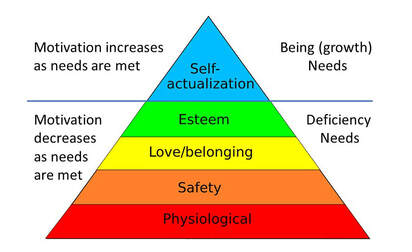About Abraham MaslowFull Name: Abraham Harold Maslow
Born: April 1, 1908 Death: June 8, 1970 Abraham Maslow was born on April 1, 1908, in Brooklyn, New York. He was a famous psychologist and known as the father of humanistic psychology. He is best known for his theory of psychological health: Maslow's hierarchy of needs. Marlow's contributions have greatly impacted the study of psychology and view on the human mind. |
Maslow's Hierarchy of Needs:
|
Theory:
Maslow's hierarchy of needs is a motivational theory that portrays the human needs. It is often expressed through a pyramidal model with 5 hierarchical levels. The needs starting from the bottom must be obtained before reaching the higher levels. The needs starting from the bottom of the model to the top are: physiological, safety, love/belonging, esteem, and self-actualization. Deficiency Needs and Growth Needs: The pyramid can be divided into two separated categories. The two categories are deficiency needs and growth needs. The first four needs (physiological, safety, love/belonging, and esteem) are classified as deficiency needs, and the last need (self-actualization) is classified as growth needs. Deficiency needs are the necessities that are required in life and act as motivation when the needs are not met. The longer that the needs are not met, the stronger the motivation will become. For example, when a person does not eat or drink anything for a long period of time, they become hungry. The longer that they do not eat, the hungrier they will become. Once a deficit is sufficiently satisfied, it will go away and the next deficit must be satisfied. This becomes a cycle and a habitual action to meet those needs. An individual does not grow from lacking something, but instead, they grow from having the desire or motivation to grow as an individual. In order to reach the highest level of the pyramid, an individual must reasonably satisfy the lower levels first. Everybody has the ability to reach self-actualization, but not everybody progresses at the same speed. Experiences in an individual's life may cause them to fluctuate between levels. Experiences such as a family death or a failed goal may cause one to slow down their growth. Therefore, A disruption can cause one to go back and forth between levels and slow down there overall progress. |



